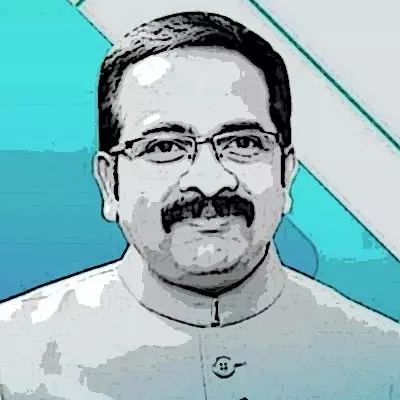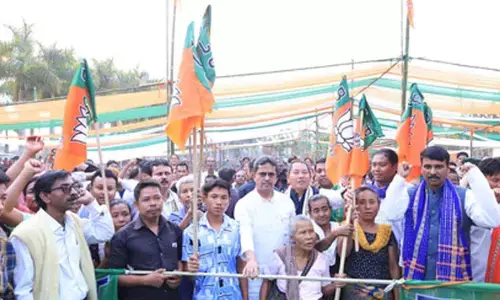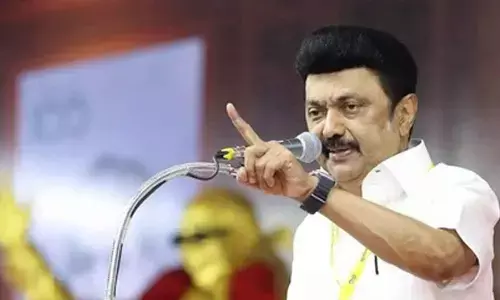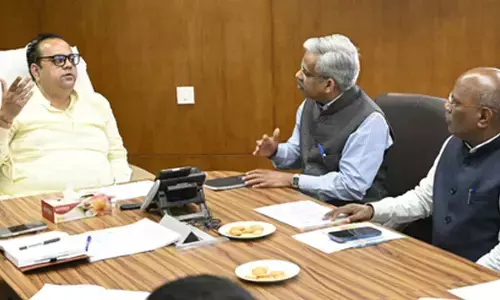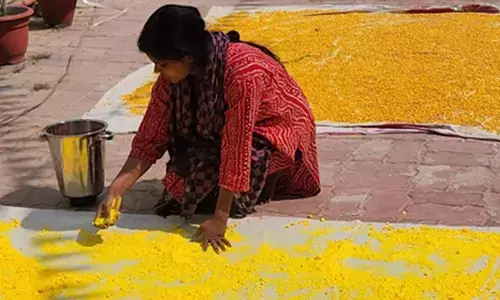Making small Indian farmers prosperous

Making small Indian farmers prosperous
Born to a big farmer from a small village in Telangana, I could experience the advantages of a big farmer and challenges small farmers faced in my village Muthyampet.
Born to a big farmer from a small village in Telangana, I could experience the advantages of a big farmer and challenges small farmers faced in my village Muthyampet. Whether it is agriculture or any other production-linked occupation, the big player has a natural advantage over the small. However, this parity need not remain the same. This disadvantage can be reversed by applying fundamental business sense.
Amul is a classic example of how marginal dairy farmers could unite to build an unmatched national brand in milk and allied products from Kaira in Gujarat. Dairy farmers who could only produce one or two litres a day were unable to sell their produce independently and the British government then had allowed monopoly in milk to a select company.
Sardar Vallabh Bhai Patel advised the villagers of Kaira to form a co-operative and pool their milk and sell it. The milk co-operative which was registered in 1946, has risen from strength to strength over decades under able, professional leadership of Dr Verghese Kurien and HM Dalaya, making lakhs of small dairy farmers millionaires.
Amul is a text book case study of what collective farming, Institutional farming or co-operative farming can do to small and marginal farmers. This legendary case-study exhibits, how small and marginal farmers can, by collaborating and collecting themselves into large group can cut cost of production, increase productivity, adopt best market practices, gain market access and sell their produce for good profits.
Amul has also ensured that these dairy farmers expand their production capability to allied areas and find alternate incomes, to not just sustain the adverse economic cycles, but also find massive value addition to their diligence.
I always pondered as I grew up; why the same model was not adopted for paddy, wheat and many other crops farmers produce across India in all other states? Though there are many successful agriculture co-operatives in Maharashtra, Gujarat, Madhya Pradesh and few other states, why did collective farming not become a national model for agriculture?
Why many State governments do not promote agri cooperatives and collective farming? Why 85 per cent of Indian farming community still has small and marginal farmers with very small land holding, and why are they still cultivating these small farms independently, when it's consistently unviable commercially?
I realised later in time, that it does not suit the political agenda of Congress party and its regional clones to promote 'Organized Farmer Communities' in India. It does not suit 'disempowerment model' these parties adopt, to empower the farmers. The sheer size of this electoral segment scares the living daylights out of them, if they were to be empowered, educated and prosperous.
The small and marginal farmers of India constitute a whopping 85 crore population. They form the base of the electoral pyramid, which no one wishes to forego. An empowered and prosperous farmer community might not choose the politicians it is choosing ignorantly for so long, that's the fear of Congress and their allies.
The electoral politics of India for decades is driven on 'compulsive poverty', 'dependence on government', and 'free dole outs' masked as 'solutions' for farmer distress. However, these are not even band-aid solutions. Even after 70 years of these failed socialist policies, India has the highest number of farmer suicides, poverty and no self-sustenance for 85 crore farmers.
The age-old electoral tactics are used to keep crores of farmers poor, illiterate, disempowered and dependent on government freebies. It suits the selfish politics of many regional parties to not allow agri cooperatives to form, grow and prosper. They even dis-member these organizations using their political and financial muscle, if any agri-coperatives were to grow strong.
Indian farmers possess massive cultivation know-how, experiential knowledge and have capacity for physical labour. The geography and topography of India is extremely fertile, climate is favorable for multiple crops and irrigation is plentiful. The nation has the potential not just to be self-reliant but also be a global hub and exporter of agricultural produce to the entire world. The true potential of Indian farmers and agricultural sector is not tapped even superficially, since independence of this nation.
PM Narendra Modi has courageously moved massive reforms in the Indian agriculture sector. He clearly understands half-hearted, partially liberating reforms will help neither the sector nor crores of small farmers. The government has unleashed comprehensive agriculture reforms, to liberate the farmers and empower them to grow with no government intervention, to limit their growth.
The three laws which have brought in much needed transformation in agriculture sector are being challenged by few farmer unions, who are unfortunately misled by the same political groups, who contained Indian farmers' growth all these decades.
Here are top three underlying intentional-drivers in the reformative laws which will make small and marginal farmers in India prosperous:
Agriculture should be considered a 'Business'
Agriculture or farming is not a social service, while it does serve the society in making it self-reliant with food supply. This sector provides employment to over 50 per cent in India, but as its not considered and conducted as 'Business', the private investments into this sector are quite small in comparison to manufacturing and service sectors.
Any activity which entails producing a product by full time workers [farmers] has to earn profits to sustain that activity for long term. Unsustainable and nonprofitable activity can't have much scope for continuity. Agriculture sector needs full spectrum investments, right from research, input, production, output, storage, processing, logistics, marketing and exports. However, for the last 70 years the human resource (farmers) in this sector has been dismally rewarded.
Farmers who work 24/7 to produce a crop should not operate in darkness and uncertainty of make profits, after they producing the crop. Certainty is the only way for continuity.
If agriculture is pursued as a professional practice by farmers, all measures can be taken to ensure the costs are managed, production is optimized and their produce is sold at good profits for farmers sustenance and growth.
Collective farming / institutional farming is the only solution
Agriculture unlike other businesses is prone to inconsistencies and unreliability due to uncontrollable climatic conditions and other volatile factors impacting production. However, all that can be covered as risk through crop insurance and adopting new technologies to mitigate risk and increase reliability of profits, to protect continuity.
Even if all conditions favour, small and marginal farmers are not in a position to make good profits. Leave alone a situation, where they might have to face the wrath of the nature in the form of untimely rains, floods or other extreme conditions. The lack of profitability, has to do with the lack of scale.
Scale is everything in business. It applies to Agriculture production too. Collective farming, through cultivation in large scale land holding can build massive operational advantage with increased scale of production. Small farmers can pool their lands for professional management of their lands to cultivate large scale production and earn good profits through 'economies of scale'.
There is no other solution to eliminate the uncertainty in small scale farming. Small scale farmers should note, if risk can be transferred to a larger entrepreneur and increase their incomes multifold as a result, shouldn't it be a great option to choose?
Prosperity is possible with decisiveness not fear
Exploitation is a fearful word. For decades the small farmers have been kept in poverty using this word, by selfish political groups. I truly believe that anywhere in the world, 'small' has a greater chance of being exploited. That's the very reason for 'small' to unite together to become 'big' and ensure they are not exploited. The three reformative laws brought in by PM Narendra Modi enables this process.
Collective farming / institutional farming ensures there no more 'Small and Marginal Farmers'. By organising themselves into large groups, small farmers can build great strength, and consolidate their might to negotiate profitable outcomes. Small Indian farmers can become prosperous. They have to trust and believe, that the three new laws passed by Modi government will liberate them, to choose the right path forward.
The Author is the BJP Chief Spokesperson / an internationally reputed Organizational Strategist

